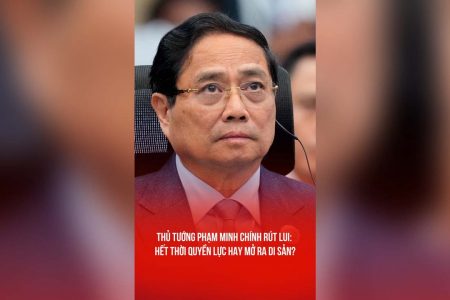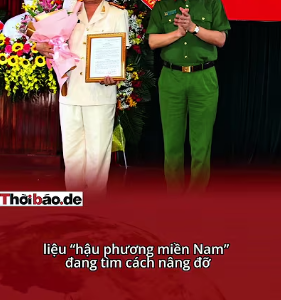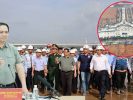China is having a lot of decisive calculations in the East Sea (South China Sea), and other countries in the region and the world, including Vietnam, ASEAN and the US need a “stronger reaction,” according to some observers in politics and security of the East Sea from Vietnam.
From the Faculty of Law, Vietnam National University Ho Chi Minh City, researcher Hoang Viet updated with BBC News Vietnamese on April 17 about China’s move in regional waters: „According to the updated information, so far, the Chinese fleet is still in the area between Indonesia, Malaysia and Brunei.“

„From the beginning, Vietnam was still concerned that China would encroach into its exclusive economic zone, but so far China has shown that the ship is still entering the waters of Malaysia, Indonesia and Brunei.
„We still don’t know what China will do, but I personally and some people still think that China has a lot of calculations that most other countries cannot know exactly what China will do.”
„So we have to keep watching, because China may invade the waters of Indonesia, Malaysia, Vietnam and Brunei.“
From Hanoi, Dr. Ha Hoang Hop, guest senior researcher at the Institute of Southeast Asia (Iseas, Singapore) commented: „From four days ago, Haiyang Dizhi 8 ran into the waters of Vietnam, then ran down and now it is in the sea bordering Malaysia and Indonesia.”
„This ship is a ship that has spent 70 days in 2019 to harass in the continental shelf of Vietnam, this time we do not know what its specific goal is.”
„But looking at this one also sees that China continues to assert its sovereignty or jurisdiction in the East Sea based on the basis of their announcement of the U-shaped line.“

Answering questions from the audience sent to the BBC asking that while the US and the world are busy dealing with the Covid-19 pandemic, what should Vietnam do? Dr. Hop said:
„Now wait and see what they do, because they haven’t made a move yet, but every country in this region, from Malaysia to Vietnam has very well prepared things to deal with the Chinese behaviors.
„We understand that Vietnam is well prepared so that nothing unexpected happens and from Vietnam we believe they are always proactive.“
If the information about the movements of the Chinese ship group appearing in the East Sea is grounded, so whether the incident involving many ASEAN countries at the same time is too ambitious, Mr. Hoang Viet commented: „China already did, we saw in 2019, when Chinese ships were encroaching upon Vietnam’s exclusive economic zone, there were also ships that invaded Malaysia and the Philippines.”
„In late 2019 and early 2020, China’s ships entered Indonesia again and caused a tension in the region.„
Regarding ASEAN issues, what can Vietnam do while holding the group’s chairmanship this year, researcher Hoang Viet continued: „In fact, Vietnam also has many ambitions during the ASEAN’s rotating chairmanship, in which Vietnam also wants to promote its role and bravery, as well as accelerate the process of finding a good Code of conduct in the East Sea.”
„However, the difficult thing is that even during the Coronavirus outbreak, the limited meeting of the parties also greatly reduced the role of Vietnam as the group’s president, and whether there was the agreement of other countries in this bloc or not.“
„Therefore, Vietnam must show its bravery and its role in the East Sea dispute, but a second issue is the challenge of solidarity in the bloc, so the issue is still very hard,“ Dr. Hop commented.
China is said to have a series of other regional actions, including conducting exercises in the East Sea, increasing its presence in the East China Sea near Japan or in the Taiwan Strait area.
To the question whether this is a Chinese reaction test, Dr. Hop said: “That certainly is, because they are practicing in the East Sea, they deliver a strong message in terms of military and defense capabilities to the countries in dispute in the sea.”
„But at the same time they have a big and direct warning to Taiwan and to Japan in the East China Sea too, this one is visible to everyone.“
Asked about the actions should be done by international and regional communities to deal with China’s aggressive moves, Hoang Viet said: „For the time being, with China’s ships, it is true that not only Vietnam has been closely following China’s move, but also that of Malaysian ships, navy ships and the Malaysian Coast Guard, have also monitored them. right on this journey and I think Indonesia is similar.
„If China takes actions that violate the security and sovereignty of these countries in the region, then the countries need to first have the strength and solidarity among the ASEAN countries.“
So what countries can take specific actions, Mr. Hoang Viet said: „ASEAN needs to have tougher and stronger reactions. The US, in addition to strong claims, also needs to take actions. harder.
„Specifically, for example, firstly for Asean countries, they must prevent China’s ships from invading the waters of each country.”
„If China can build rigs, or place an exploration in the continental shelf or exclusive economic zone of any Southeast Asian nation, then it is dangerous for all countries in the Southeast Asia.
„But not being caught in the trap that China is setting is meant to lead to military conflict.
„Second, the US side, in addition to its strong statements, Washington must also send stronger messages, including strengthening patrol activities or making messages willing to have tough reactions, then the situation will be different.“
The US on April 18 called on China to stop „bullying action“ in the East Sea and expressed concern about its provocative moves to offshore oil and gas operations.
The US State Department spoke after the news that Haiyang Dizhi 8 followed the West Capella oil tanker of Petronas Petroleum Company (Malaysia) operating in the East Sea.
The US State Department said: „The United States is concerned about the news that China repeats provocative actions aimed at offshore oil development activities of other countries. In this case, China should stop bullying and avoiding provocative acts as well as instability in the region.”
Justifying these actions, the Chinese Foreign Ministry’s spokeswoman said the Haiyang Dizhi 8 vessel was carrying out normal activities and accused US officials of defaming Beijing.
According to data from Marine Traffic, a website specializing in tracking ships, geological survey ships Haiyang Dizhi 8 is still in EEZ of Malaysia on April 18.
A Malaysian security source said that Haiyang Dizhi 8 was once escorted by more than 10 Chinese ships, including maritime vessels and militia ships.
On April 17, Professor Nguyen Manh Hung, an international diplomat researcher from George Mason University commented on this new move of China as follows: “As far as I know, by the afternoon of April 15, China’s Haiyang Dizhi 8 was still hovering closer to Malaysia’s Luconia Shoal than Vanguard Bank Beach, and at that time there was 3 Vietnamese ships watched.
Remember, Malaysia recently supported Vietnam in China’s fishing boat stabbing on April 3, by blaming China for its petty actions to „protect fish and imagined historical rights“ while „Covid-19 is the real threat that requires solidarity and mutual trust“ to cope.
China’s tactic is to be soft, to let go and to take advantage of opportunities that the international community and neighboring countries are struggling to cope with the Covid-19 pandemic, at the same time the US aircraft carrier Theodore Roosevelt is paralyzed by the disease.
Recently both the State Department and the US Department of Defense have made public statement to declare deep concern or specifically condemn the Chinese behavior of sinking Vietnamese fishing vessels in regional waters.
It is a new signal reflecting a consensus in the United States of a tougher policy with China from the pressure of the US military, strategists and Congress, along with the economic-trade conflict between the two countries. Professor Nguyen Manh Hung commented.

“China’s ultimate goal does not change, but its implementation depends on the calculation of China’s opportunity. This opportunity is subject to temporary changes, such as the Covid-19 pandemic, and changes in the force balance.
Small countries in the region must act carefully to protect their rights and sovereignty.
If for these reasons, America’s position is down, then China’s position will be up, and China’s pressure on small countries in the region will increase. That is the concern of these countries.
In general and in the long run, the world has to deal with the „Chinese challenge“ and the change is happening in the world order, who goes up and down, stemming from strategic competition between the US and China.
However, the Coronavirus pandemic also undermines America’s position, not only economically but also in its leadership towards creating a world order that reflects the value of Western humanity. After World War II, the United States led and unified the so-called „Free World“ to rebuild the crumbling economy and society in Europe, fighting against communist expansion. America benefits but also has to sacrifice a lot.
The balance of power and world order is changing and the US leadership and coordination is needed to address common concerns, such as climate change, economic recovery and Chinese challenges. Without this leadership and coordination, the world will be divided into many divisions to unite, protect, and adapt to China’s challenges.
It is a concern for countries that do not want to live in a new Chinese-led world order ( Chinese World Order.”
Professor Nguyen Manh Hung reached a conclusion that China did not hesitate to throw away the „frivolous friendship“ by action in April 2020 that established two districts managing the Hoang sa (Paracels) and the Hoang Sa (Spratlys) of Vietnam.
So Mr. Nguyen Phu Trong and the Communist Party as well as its Government in Hanoi can only sue China for international courts and alliances with the US and democratic and free countries in the world to protect their own sacred territorial rights of the Fatherland.
If this is not done, the Communist Party of Vietnam will become the criminal group of the nation, leaving the darkest stain in the history of national construction and defense when fails to protect the country’s territory.
Thu Thuy from Hochiminh city – Thoibao.de (Translated)


























